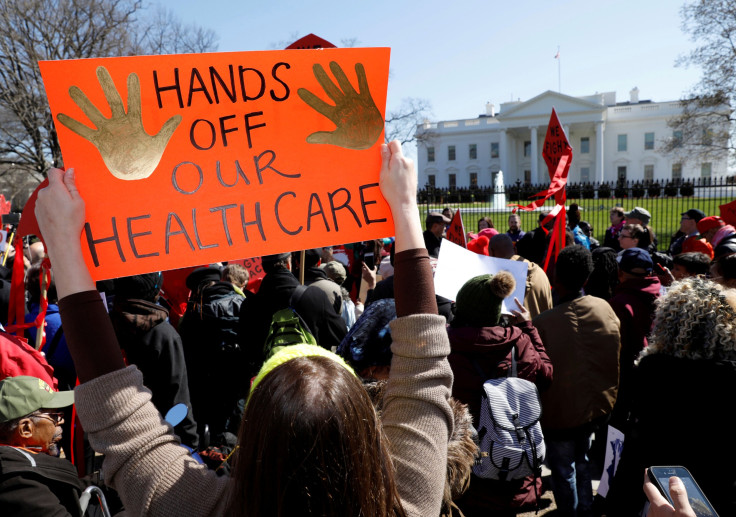Obamacare Repeal Could Mean 2.6 Million Lost Jobs By 2019

The Senate Trumpcare bill would not only remove around 22 million people from insurance coverage, it could cost about 2.6 million jobs nationwide in 2019, rising to almost 3 million by 2021.
This estimate on job shortfalls was done in a study by public health analysts at George Washington University, which said around a million jobs would be lost in the healthcare sector alone.
"Repealing key parts of the ACA could trigger massive job losses and a slump in consumer and business spending that would affect all sectors of state economies," said Leighton Ku, director of the Center for Health Policy Research and professor at the Milken Institute School of Public Health at the University, CNBC reported.
READ: Is Obamacare Working?
The report examined the economic consequences of repealing two key elements — federal premium tax credits that help low and middle-income Americans afford insurance policies and federal payments to states for expansions of Medicaid eligibility for low-income adults — of Affordable Care Act by the Trump administration.
“Repealing premium tax credits, by itself, would be responsible for the loss of about 1.1 million jobs in 2019. The repeal of Medicaid expansion alone would reduce employment by 1.5 million,” the study stated.
This would not only reduce jobs in the healthcare sector but would have repercussions in multiple sectors of state economies.
Almost all of the jobs lost are in the private sector. Almost a million (912,000) are in health care, while the remaining two-thirds are in other industries, including construction, real estate, retail trade, finance and insurance, the study stated.
The biggest job losses have been estimated in California with 334,000 jobs. Followed by Florida (181,000), Texas (175,000), Pennsylvania (137,000), New York (131,000), Ohio (126,000), Illinois (114,000), Michigan (102,000), New Jersey (86,000) and North Carolina (76,000).
A study by Economic Policy Institute (EPI) released earlier this year, and which too examined the economic repercussions of Obamacare repeal, stated the poorest states in the country will be hit hardest by the job shortfalls.
READ: When Will Obamacare Be Repealed And What Happens Next?
"When the Medicaid expansion and insurance and cost-sharing subsidies were implemented in 2014, they provided a noticeable (and needed) boost to states’ economies and job markets. Even with the fiscal boost provided by the ACA, overall fiscal policy at both the state and federal level was extraordinarily austere in the post-2011 portion of the recent economic recovery, relative to previous economic recoveries,” according to report author Josh Bivens, EPI's director of research and an expert in macroeconomic studies, Fortune reported.
“Repealing the ACA would constitute a contractionary fiscal shock going forward that would reduce the pace of economic growth and cost jobs," Bivens added.
Furthermore, the study by George Washington University said even states that did not expand Medicaid would lose jobs and experience economic losses if Medicaid expansions were revoked in other states.
“All the states will experience negative economic effects if Medicaid expansions are revoked, even the 19 states that have not expanded. Workers and businesses located in Medicaid expansion states purchase goods and services from nonexpanding states, so the negative effects of canceling Medicaid expansions ripple out to all states,” the study said.
© Copyright IBTimes 2024. All rights reserved.





















